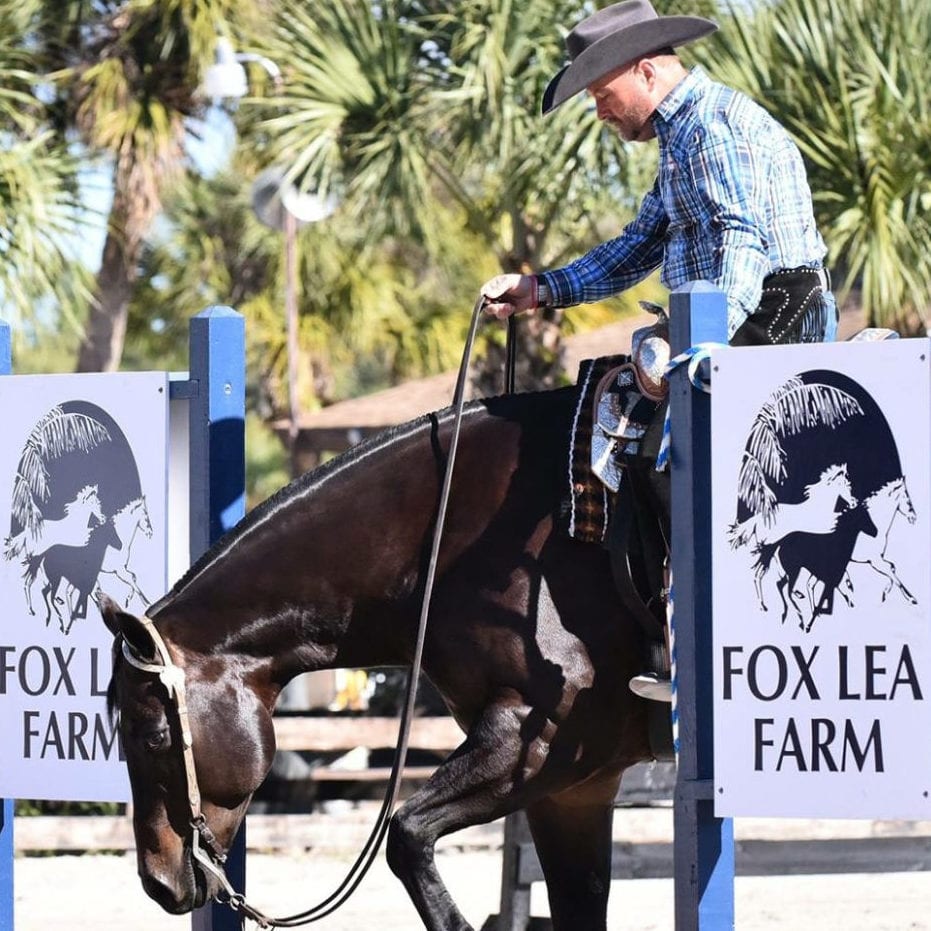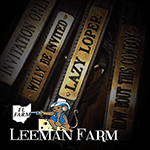Horse trainers are the glue that holds the equine industry together. They work endless hours, sharing their knowledge and wisdom. Their efforts inspire the next generation. Trainers are often counted on to wear the hat of coach, psychologist, parent, spouse, driver, groom…the list goes on and on. And, as such, the journey to becoming a professional horseman is both challenging and rewarding.
Like most who work in the equine industry, they are driven by their passion and love of horses. Some well-known and highly regarded trainers commented on how and why they became a horse trainer. They also offered helpful tips to those who are interested in entering the field.
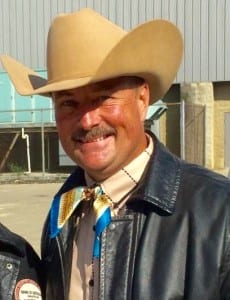 Brent Maxwell – I never grew up around horses but was always fascinated by them. I became involved in 4-H when I was thirteen. Even though I ate a lot of dirt, I decided that training horses was for me. My wife, Melissa, and her family probably had the most impact on my commitment to train. I’d say that being mostly self-taught has made me a better rider. I didn’t have the best horses in the beginning, but I worked hard and was fortunate enough to show with a large group of extremely talented trainers in Ohio who I could observe, ask questions and then apply different techniques to help advance myself.
Brent Maxwell – I never grew up around horses but was always fascinated by them. I became involved in 4-H when I was thirteen. Even though I ate a lot of dirt, I decided that training horses was for me. My wife, Melissa, and her family probably had the most impact on my commitment to train. I’d say that being mostly self-taught has made me a better rider. I didn’t have the best horses in the beginning, but I worked hard and was fortunate enough to show with a large group of extremely talented trainers in Ohio who I could observe, ask questions and then apply different techniques to help advance myself.
The biggest challenge for me was to learn to be patient with some of the horses that I trained for the all-around events. Not all horses are ready to accept training for different events at certain stages in their career. Put some hours in working for different trainers. Most people go to college for four years to get a degree. I recommend that amount of time doing the grunt work in different programs while you develop your skills. But you probably should get that degree first…. just in case.
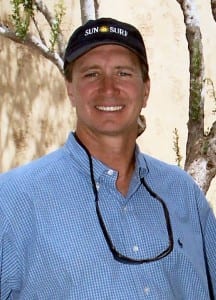 Mark Sheridan – Mostly because I love horses, and I simply wanted to have a career in life where I “wanted” to go to work, instead of “having” to go to work. My parents were very supportive of my decision to choose a life as a horse trainer. Working very closely with Dale Wilkinson and Clark Bradley, along with all the other staff members at the University of Findlay, that started to create the knowledge that fueled the passion. I would say to never stop learning, as the industry is constantly changing, and for the most part has been a good thing. Trying to stay open minded and not just be a good trainer of the animal, but to also be able to teach as well. Along with the Education at Findlay, a long apprenticeship with Doug Lilly taught me about work ethic.
Mark Sheridan – Mostly because I love horses, and I simply wanted to have a career in life where I “wanted” to go to work, instead of “having” to go to work. My parents were very supportive of my decision to choose a life as a horse trainer. Working very closely with Dale Wilkinson and Clark Bradley, along with all the other staff members at the University of Findlay, that started to create the knowledge that fueled the passion. I would say to never stop learning, as the industry is constantly changing, and for the most part has been a good thing. Trying to stay open minded and not just be a good trainer of the animal, but to also be able to teach as well. Along with the Education at Findlay, a long apprenticeship with Doug Lilly taught me about work ethic.
For me, it is not how many World Champions you have trained, or how many times you won the Congress, but what kind of parent you were. In the end, the trophies will not matter. As a single parent that raised a son, I find more enjoyment when I see my son Hayden’s success currently as a Georgia Tech graduate assistant basketball coach and working on his Master’s Degree, than over any win at a horse show.
I feel that the greatest challenge that most trainers are still facing is, what do we do when we are old and can’t ride all day? There is no pension or retirement program for old horse trainers. If you have ridden horses for most of your life, when age creeps up on us, you will have most likely been in a wreck or two, and have a body that is pretty beat up unless you could afford to have people to do all the hard work for you along the way.
There truly is not just one piece of advice that I could offer to someone. More like one hundred and one pieces of advice that I could offer. I will start with a college education. Get a degree, AA BS, or more graduate degrees. The more education you have; the more options you will have later in life. Secondly, apprentice for a good horse trainer. Do your research and find the right individual and go to work for them for at least five years. Work hard, be honest, be kind to the animals, be professional, and success will follow.
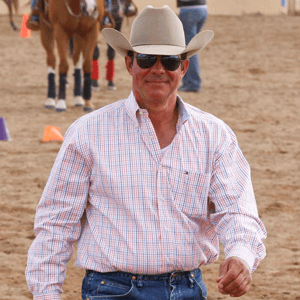 Troy Compton – I grew up in the industry. My dad was a trainer and I wanted to be like him. My dad was killed in a car accident while driving to a horse show when I was eleven, so that was something that had a great impact on my decision to become a trainer. I have been getting on as many horses as I can remember since I was a little kid. I had the opportunity to ride with the best trainers in the country in a lot of different disciplines. Riding in different events and applying them to training is what has molded me as a rider. The biggest challenge I’ve faced would be trying to make a living doing what I love. You need to have a passion for the horses. If you don’t have a true passion for the horses, then becoming a horse trainer is not worth pursuing. It’s not about the rigs or the accomplishments; it’s just about having that bond with the horses.
Troy Compton – I grew up in the industry. My dad was a trainer and I wanted to be like him. My dad was killed in a car accident while driving to a horse show when I was eleven, so that was something that had a great impact on my decision to become a trainer. I have been getting on as many horses as I can remember since I was a little kid. I had the opportunity to ride with the best trainers in the country in a lot of different disciplines. Riding in different events and applying them to training is what has molded me as a rider. The biggest challenge I’ve faced would be trying to make a living doing what I love. You need to have a passion for the horses. If you don’t have a true passion for the horses, then becoming a horse trainer is not worth pursuing. It’s not about the rigs or the accomplishments; it’s just about having that bond with the horses.
 Nancy Sue Ryan – When I was about ten years old, my mother bought a broodmare and her foal for $300. The little foal by the mare’s side was my first horse. I worked and trained that horse by myself. I fell into the business when I had the opportunities to work with some very skilled trainers. I’ve become the rider I am today because I think the way the horse thinks. This is especially useful when working with difficult horses. Every horse is different; I want to fit into their individual programs. I’ve found that keeping up with your standards and constantly pushing your limits has been the greatest challenge. My advice is, be honest with your customers and to always be true to the animal.
Nancy Sue Ryan – When I was about ten years old, my mother bought a broodmare and her foal for $300. The little foal by the mare’s side was my first horse. I worked and trained that horse by myself. I fell into the business when I had the opportunities to work with some very skilled trainers. I’ve become the rider I am today because I think the way the horse thinks. This is especially useful when working with difficult horses. Every horse is different; I want to fit into their individual programs. I’ve found that keeping up with your standards and constantly pushing your limits has been the greatest challenge. My advice is, be honest with your customers and to always be true to the animal.
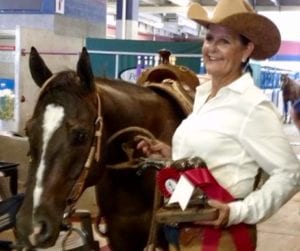 Sandy Jirkovsky – I was a lucky one who grew up with my dad as a horse trainer. My dad is the person who had the greatest impact on my decision to become a horse trainer. He was my mentor. The greatest challenge is finding the time to do everything I want to do. Another challenge would be adapting my training program as time goes on. My advice to those interested in becoming a trainer would be, “Do your job and then some.”
Sandy Jirkovsky – I was a lucky one who grew up with my dad as a horse trainer. My dad is the person who had the greatest impact on my decision to become a horse trainer. He was my mentor. The greatest challenge is finding the time to do everything I want to do. Another challenge would be adapting my training program as time goes on. My advice to those interested in becoming a trainer would be, “Do your job and then some.”
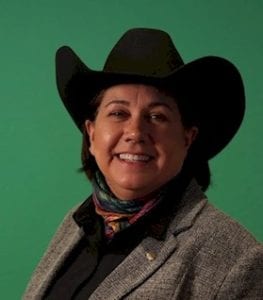 Karen McCuistion – I’ve been in love with horses my entire life, so it was probably inevitable. I didn’t start out with a well-formulated plan to be a trainer. It kind of just happened. My dad bought me my first horse when I was 10. I attended the University of Wyoming so I could have my favorite horse with me. I was a poli-sci major on a pre-law track for about three semesters, but (foolishly) I spent more time breaking colts and riding other horses while I was in Laramie than I did attending classes. That’s when I realized training horses was my real dream.
Karen McCuistion – I’ve been in love with horses my entire life, so it was probably inevitable. I didn’t start out with a well-formulated plan to be a trainer. It kind of just happened. My dad bought me my first horse when I was 10. I attended the University of Wyoming so I could have my favorite horse with me. I was a poli-sci major on a pre-law track for about three semesters, but (foolishly) I spent more time breaking colts and riding other horses while I was in Laramie than I did attending classes. That’s when I realized training horses was my real dream.
Jack Kyle and Jackie Krshka opened a whole new world for me when they allowed me to work as an assistant trainer for them in Yukon, OK. They put me on my first good western riders and reiners. In the almost two years I worked there, I learned more about training, showing, and the horse industry than I would have learned in a lifetime had I stayed in Wyoming.
Bonus – I met my husband Carl while working for Jack and Jackie and he was working for John Hoyt at the time. I’ve been so blessed; I don’t feel comfortable claiming any real challenges. Commit 110% of yourself to learning everything and anything you can about this life you’ve chosen. This means swinging a leg over anything with four legs and a whinny. The more variety in the horses you ride, the more you learn. This means long hours in the heat, dust, wind, cold and ice. This business isn’t for the faint of heart. Commit to learning about other breeds and other disciplines, then apply the knowledge to your own world.
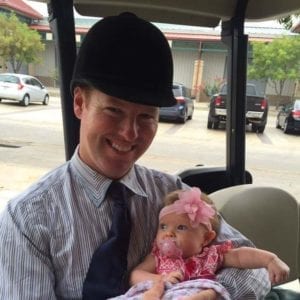 Keith Miller – Surprisingly, I wanted to be an equine veterinarian since the age of five. I was a good student and worked in a vet clinic for quite some time. That all changed when I took my first AP chemistry class as a junior in high school and decided that I no longer wanted to become a vet. With that being said, I have always been a horse crazy kid.
Keith Miller – Surprisingly, I wanted to be an equine veterinarian since the age of five. I was a good student and worked in a vet clinic for quite some time. That all changed when I took my first AP chemistry class as a junior in high school and decided that I no longer wanted to become a vet. With that being said, I have always been a horse crazy kid.
There are three people who have helped me get into horse training. Tammy Mace and Natalie Unger were mentors as a youth in 4-H. They were avid showers at the breed level and allowed me to tag along. They introduced me to Ray Carmean, whom I worked for as an assistant for quite a few years. Without them, I’m not sure I would have become a horse trainer. I can honestly also say that I have watched so many good people over the course of time. I still do. I’m always looking for a different approach that might work better for certain horses. I have admired many horsemen throughout the years. Whenever I have a chance at a horse show, you can find me watching the warm-up arenas. I don’t think there’s a better place to learn.
It’s a hard business, plain and simple. It is also the most rewarding. With the cost of overhead and startup, it is expensive to have all the equipment needed. Truck, trailer, barn, hay, shavings, saddle, bridles, show equipment, etc. the financial aspects of the business add up quickly. But, it also allows my family and me the ability to spend the day together, and travel, and meet new and wonderful people throughout the country.
You need to be willing to do everything – cleaning stalls, walking sick horses, fixing fences, taking out the garbage, mowing (and more mowing!). There is always something that needs to be done on a farm. The days are long and hot, or cold in the winter and the horses always need to be tended to. In addition, the quality of horses you have need to continue to grow and you need to make sure that you, your horses, and customers are competing at that level. And the only way horses get broke is through sweaty saddle pads.
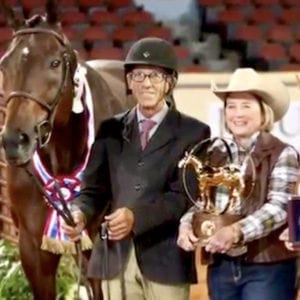 Jerry Erickson – I was unsure that I wanted to be a horse trainer, actually. While in college, I was unable to settle on a major and rode horses only for spending money. I took a part-time job doing evening chores for a local veterinarian who was a Quarter Horse breeder. At that time, I had only been involved in saddle club activities and showed grade horses in open shows. Dr. Vezina started taking me to Quarter Horse shows then started sending me on my own. Without a major and with more training horses, I simply continued and here I am 40 years later a horse trainer.
Jerry Erickson – I was unsure that I wanted to be a horse trainer, actually. While in college, I was unable to settle on a major and rode horses only for spending money. I took a part-time job doing evening chores for a local veterinarian who was a Quarter Horse breeder. At that time, I had only been involved in saddle club activities and showed grade horses in open shows. Dr. Vezina started taking me to Quarter Horse shows then started sending me on my own. Without a major and with more training horses, I simply continued and here I am 40 years later a horse trainer.
I would say the observation of the winning horses and trainers played a major role in my gradual improvement. I have been very fortunate over the years, and I am not immediately identifying any major challenges. What does come to mind is the financial aspect of being a horse trainer. Without a financial plan, over the years, I simply made ends meet and at times that was difficult. So many trainers are outstanding and talented riders. I observe a number of young, aspiring trainers who I think possess great talent. That being said, I do not think this quality is the only path to success as a horse trainer. I believe being observant and smart is the major key to longevity in this business. Don’t think that your physical ability alone will make you a success.
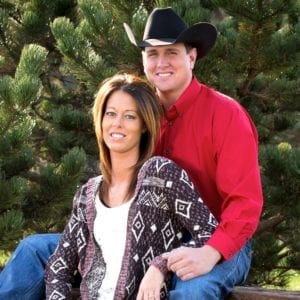 Adrienne Cober – For me, it was because it was very hard to afford to horse show as a non-pro and have a mortgage, car payment etc. Basically, the costs of being an adult. With the encouragement of friends and family, I took the leap and started my business training horses. I would say that Linda Paulsen and Carrie Nickerson had the biggest impact on me becoming a trainer. They truly believed in me and stood behind me from the start and still to this day. Their encouragement through the good and bad means the world to me, and I am forever grateful to them for giving me the opportunity to train some of their horses.
Adrienne Cober – For me, it was because it was very hard to afford to horse show as a non-pro and have a mortgage, car payment etc. Basically, the costs of being an adult. With the encouragement of friends and family, I took the leap and started my business training horses. I would say that Linda Paulsen and Carrie Nickerson had the biggest impact on me becoming a trainer. They truly believed in me and stood behind me from the start and still to this day. Their encouragement through the good and bad means the world to me, and I am forever grateful to them for giving me the opportunity to train some of their horses.
I can say that within the last five years all my dreams have started to come true. The greatest challenge has been trusting my gut. It seems that the world of horse training is full of opinions and that’s very hard to deal with sometimes. What looks good to one person doesn’t to another so it was challenging for me to listen to everyone’s opinion but still trust my gut instinct. Always believe in yourself no matter what. This is not an easy industry and it takes a lot of hard work and dedication. If you truly believe in yourself, I think anyone can make their goals in life come true.
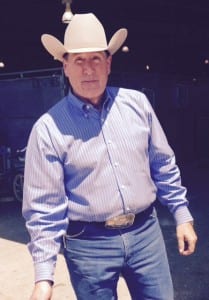 Jeffery Pait – My brothers and I all grew up showing ponies, and then we were lucky enough to have Quarter Horses. I loved being with the horses, enjoyed teaching and working with the young horses. While going to college, I worked part-time for Gene Parker and ended up working full time. I have been doing it ever since. There were a couple of people who were influential in my decision. My father had become an AQHA Judge and very involved with the American Quarter Horse. Gene Parker noticed that I had a talent and encouraged me to pursue training. Gene gave me my first job in the Quarter Horse Industry. As a youth, I showed in the all-around events. I have trained several AQHA Champions and superiors in western pleasure.
Jeffery Pait – My brothers and I all grew up showing ponies, and then we were lucky enough to have Quarter Horses. I loved being with the horses, enjoyed teaching and working with the young horses. While going to college, I worked part-time for Gene Parker and ended up working full time. I have been doing it ever since. There were a couple of people who were influential in my decision. My father had become an AQHA Judge and very involved with the American Quarter Horse. Gene Parker noticed that I had a talent and encouraged me to pursue training. Gene gave me my first job in the Quarter Horse Industry. As a youth, I showed in the all-around events. I have trained several AQHA Champions and superiors in western pleasure.
As the years went on I started to specialize in Halter. I have had the opportunity to show several nice horses over my career. I have worked for great people privately and went out on my own in 2013 and been blessed with wonderful clients who have given me fantastic horses to show. In the beginning, it takes a long time and belief in yourself to get to the winner’s circle. You have to continue to put in 110% and pay your dues to become successful. The rewarding things in life do not come easy and are even harder to hold on to. Once you reach where you want to be, you have to work twice as hard to stay there. Work hard, be honest and find a good horseman as your mentor. Treat your customers and horses with respect and you will be rewarded down the road.”


